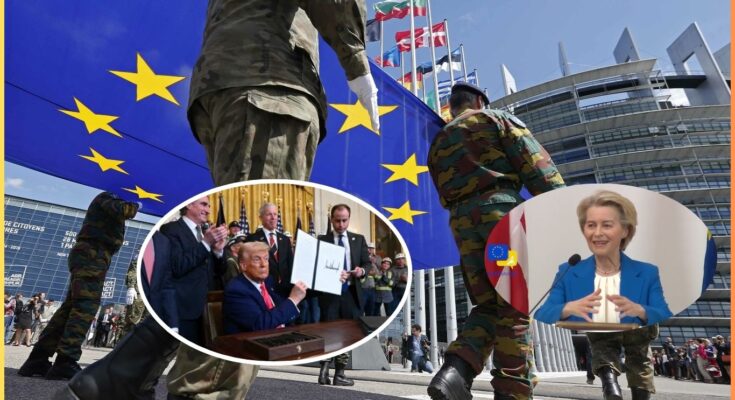Imagine your government telling everyone to have extra food and water stored at home, just in case something really bad happens – like a big emergency or even a war. That might sound like something out of a movie, but right now, several countries in Europe are doing just that. They’re urging their citizens to get prepared, and it raises a big question: will people actually listen?
Why the Sudden Push for Preparedness?
- Rising Tensions: Over the past few years, things have felt a bit more shaky in Europe. There have been conflicts in nearby regions, and relationships between some powerful countries have become strained. This has made European governments think more seriously about the possibility of bigger problems.
- Learning from Crises: Think about events like natural disasters or big accidents. These events show how important it is for people to be able to take care of themselves for a little while if help can’t reach them immediately. Governments are realizing that the same idea applies to bigger, more serious situations, including the possibility of conflict.
- A Shift in Thinking: For a long time, many people in Europe felt relatively safe from large-scale conflicts. But the recent changes in the world have made governments rethink this. They want to build a society where people are more resilient, meaning they can bounce back more easily from tough times.
Europe’s “Be Prepared” Campaign: Stockpiling for 72 Hours
The European Commission, which is like the main governing body for the European Union, has told all countries in the EU that they need to encourage their citizens to have enough essential supplies to last for at least three days – that’s 72 hours.
- Why 72 Hours? This timeframe is based on the idea that in a major crisis, it might take emergency services a few days to get organized and reach everyone. If people have their own basic supplies, it can help them stay safe and make things easier for the responders.
- What Kind of Supplies? The guidance suggests things like non-perishable food (food that doesn’t spoil easily, like canned goods or dried pasta), bottled water, a first-aid kit, a flashlight, batteries, a radio that doesn’t need electricity, and any necessary medications.
- Building a “Culture of Preparedness”: The European Commission isn’t just talking about having stuff at home. They want to create a mindset where people understand that being prepared for emergencies is a normal and responsible thing to do. This means knowing what to do in different situations and having a plan.
Germany’s Detailed Defense Plan: A Changed Daily Life
Germany, a major country in Europe, has gone even further. They updated their “Framework Directive for Overall Defense,” which is basically a set of instructions for what to do if there’s a war in Europe.
-
- Total Transformation: This plan imagines a complete change in how everyday life works for German citizens if a conflict breaks out. It’s not just about individual preparedness; it involves how the whole country would operate.
- Government Control: In a war situation, the German government would have more control over things like food and energy supplies, transportation, and communication. This is to make sure essential resources are managed effectively.
- Civilian Support: The plan also talks about how regular citizens might need to help with defense efforts, although it doesn’t necessarily mean fighting. This could involve things like helping with emergency services or providing support to the military.
@tiktokeverydayinsights Is UK going to War 😦 #uknews #news #war #ukgovernment
Sweden’s Survival Guide: “If Crisis or War Comes”
Sweden, a country that has historically been neutral but is now more closely aligned with NATO, took a direct approach by giving millions of households a booklet called “If Crisis or War Comes.”
- Updated for a More Dangerous World: This wasn’t a new idea; Sweden had a similar guide before, but they updated it for the first time in six years because they see the military threat level as increasing.
- Warning Systems: The booklet explains how people would be warned if there’s a war or another major emergency. This includes outdoor sirens that are used in most areas.
- “Go Indoors”: One of the key instructions is, “Go indoors, close all windows and doors and, if possible, switch off the ventilation.” This is to protect against things like dangerous chemicals or airborne threats. They also tell people to listen to the Swedish public radio for more information.
- Finding Shelter: The guide gives advice on where to take shelter during an air raid, suggesting places like basements, garages, and underground train stations. If someone is caught outside, they’re told to lie on the ground, preferably in a ditch or low spot.
- Nuclear Attack Advice: Surprisingly, the booklet even includes specific advice for nuclear attacks. It tells people to take cover just like they would in an air raid, noting that civil defense shelters offer the best protection. It also mentions that radiation levels will go down significantly after a couple of days.
- Beyond Immediate Danger: The Swedish guide also covers other important topics like how to stop bleeding, how to deal with anxiety during a crisis, and how to talk to children about scary events like war. It even has tips on evacuation.
Finland’s Long History of Preparedness: A Border with Russia
Finland, which shares a long border with Russia, has a deep-rooted culture of preparing for the possibility of conflict with its neighbor.
- Decades of Preparation: For Finland, this isn’t a new thing. They’ve been thinking about and preparing for potential conflict with Russia since the 1950s.
- Mandatory Bomb Shelters: One of the most significant examples of this preparedness is that building bomb shelters under apartment buildings and office buildings has been required by law in Finland since the 1950s. This means a large portion of the population has access to protected spaces.
- National Psyche: For Finns, being ready to defend their country is a fundamental part of their national identity. They have a strong military reserve and a population that is generally aware of the importance of national defense.
Will They Listen? The Challenge of Public Engagement
While governments are putting these plans in place and urging citizens to prepare, the big question is whether people will actually take the advice seriously.
- The “It Won’t Happen to Me” Mentality: One of the biggest challenges is getting people to believe that a major crisis, especially a war, could actually affect them. It’s easy to think that these kinds of things only happen in far-off places.
- Information Overload and Distraction: In today’s world, people are bombarded with information from many different sources. It can be hard for important messages about preparedness to cut through the noise and grab people’s attention.
- The Cost and Effort of Preparedness: Stockpiling food and supplies costs money and takes effort. Some people may not have the financial resources or the time to properly prepare.
- Psychological Barriers: Thinking about war and major crises can be scary and overwhelming. Some people might avoid the topic altogether as a way to cope with anxiety.
- Trust in Government: How much people trust their government can also play a role. If people don’t trust the authorities, they might be less likely to follow their advice.
The Importance of Clear Communication
For these preparedness campaigns to be effective, governments need to communicate clearly and effectively with their citizens.
@metrouk The EU has asked citizens to put together 72-hour emergency survival kits in case of crisis. The kits, which would contain important items such as food, water, and identity documents, would be used in case of an emergency such as war or climate disaster. The EU released its Preparedness Union Strategy with goals to prepare the union for any crisis it could face in future. #europe #news #worldnews #survival #war #europeanunion
-
- Simple and Direct Messaging: The message needs to be easy to understand and should clearly explain why preparedness is important.
- Reaching Different Audiences: Governments need to use various methods to reach different groups of people, including traditional media, social media, and community outreach.
- Providing Resources and Support: Making it easier for people to prepare by providing information on what to buy and where to find resources could increase participation.
- Building Trust and Transparency: Being open and honest about the potential threats and the reasons for preparedness can help build public trust and encourage cooperation.
@lbizjournotok 🚨 Your weekend wine night might be in danger… 🍷🥃 Trump just threatened a 200% tax on all European alcohol! That means your fave French wine, Italian prosecco, or Irish whiskey could get WAY more expensive in the US. 💸💀 Would YOU still buy that $60 bottle? Or is it time to switch to bourbon? 👀👇 #TrumpTariffs #TradeWar #WineLovers #Whiskey #Economy #FinanceNews #Trending #MoneyMatters #BusinessNews #EU #USA #Politics #ViralNews #FYP
Conclusion: A Changing Europe and the Responsibility of Citizens
Europe is facing a period of increased uncertainty, and governments are taking steps to ensure their citizens are better prepared for potential crises, including the unthinkable possibility of war. The detailed guidance from the European Commission, Germany, and Sweden highlights a growing recognition that resilience at the individual level is crucial for national security and stability.
However, the success of these efforts hinges on whether European citizens will heed the call to action. Overcoming the “it won’t happen to me” mindset, navigating information overload, and addressing the practical and psychological barriers to preparedness will be key challenges. Clear, consistent, and trustworthy communication from governments will be essential in fostering a true culture of preparedness and ensuring that when Europe asks its citizens to get ready, they will listen.




